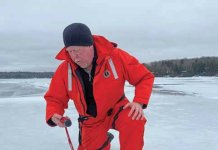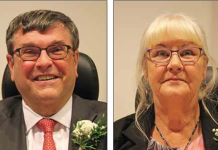Through their Zoom screens, County residents gave feedback on varying setbacks, a streamlined application process, and raised questions about the consultation process itself during the second draft shoreline bylaw town hall.
Hosted by J.L Richards (JLR) and Hutchinson Environmental (HES), the discussion focused on proposed changes to the bylaw rather than the restrictions of the previous draft bylaw itself.
Many of the 12 who spoke publicly, however, referred to the previous draft, which Jason Ferrigan said “represents a point in the conversation, but we are moving beyond that point in the conversation.”
Specifically, JLR and HES were tasked with reviewing and then presenting a new draft bylaw, taking into consideration the opinions of stakeholders and the public while pursuing peer-reviewed scientific research and comparative studies of other municipalities.
Conner Harris, representing Black Rock Landscaping, said the previously proposed bylaw would seriously hamper business. Its permit process, which JLR suggests streamlining to make it less onerous and expensive, would mean potential clients would be far more hesitant to proceed with building projects.
Harris said the cost of undertaking the permit process would be “disproportionate to the value of the project being pursued and in Black Rock’s view essentially amounts to prohibition by way of regulation.”
Despite those concerns, Harris said the company is encouraged by the direction they see the draft bylaw going.
“So far that process has given Black Rock cause for optimism that these concerns are being considered and will be fully incorporated into the final product when it’s considered by council.”
JLR has proposed multiple policy improvements which they suggest could improve the draft bylaw.
These include: creating a plain language bylaw; aligning the purpose of the bylaw with in-effect policies; creating a consistent area of application, harmonizing the bylaw with local requirements; recognizing variable site conditions; using performance-based standards; streamlining application requirements; broadening the matters that can be referred to council and creating a framework for transitioning to the new rules.
Disappointment with consultation process
Tayce Wakefield, a representative from a group of 150 properties on Kennisis Lake and other Haliburton lakes, said she “regrets [their] input was not sought” by consultants. Wakefield, who also addressed planners at the County’s July open house, spoke for approximately 17 minutes, outlining multiple key elements of the previous draft bylaw and raised questions which she said “remain to be answered.”
Wakefield’s group initially proposed to present a PowerPoint during the meeting. “It helps to make a clearer and more focused presentation,” she said. Their request was denied.
“It does cause us to question how interested you are” in receiving thoughtful input from property owners,” she told planners and council members. The slideshow presentation outlines multiple issues the group sees in the consultants’ report, including how the previous draft did not include renaturalization incentives.
At the beginning of the meeting, Warden Liz Danielsen said the issue of PowerPoint presentations is a “matter of equitable treatment of all presenters.”
“Those individuals making delegations at our initial meeting didn’t have that opportunity and we want to make sure we offer fair and equitable treatment for all those who have comments they wish to make,” she said.
Wakefield and subsequent speaker Thomas Moch said they support healthy lakes but were concerned by how the previous bylaw “further restricts [the] enjoyment of [their] properties.”
“No one intentionally goes out to destroy their habitat or destroy their lake in a negative context,” Moch said.
Terry Moore, of Environment Haliburton! also had suggestions for a reconfigured consultation process; one which would work towards a common understanding of facts and science apart from the “vitriolic” discourse on social media sites like Facebook.
“We need to organize, I think, public discussion forums where we can talk about where we’re coming from and why.”
Council is set to receive a new draft bylaw Oct. 27.




